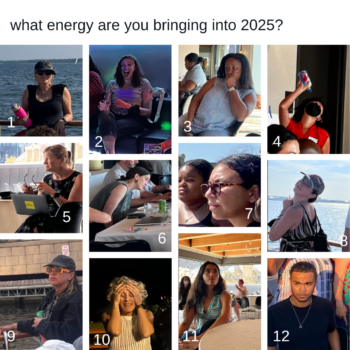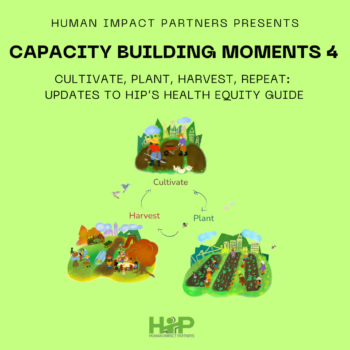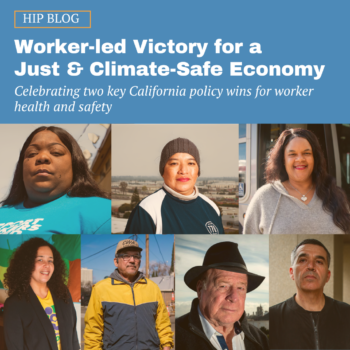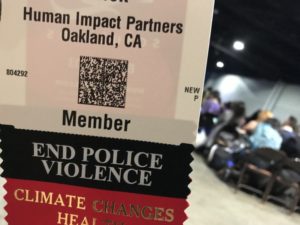
| By Sari Bilick |
Earlier this month I attended my first American Public Health Association (APHA) Annual Meeting, joining 12,000 other public health professionals in an overwhelming four days of speakers, panels, networking — and yes, protest!
Last year, the APHA Governing Council temporarily passed a policy statement, “Law Enforcement Violence as a Public Health Issue.” Because it was so controversial, this policy statement was only passed for one year and came up for review again this year.
The authors of the proposed policy statement spent the past year strengthening the statement, incorporating feedback, adding more data sources and gaining support from the community both inside and outside of public health.
This year, the authors showed up at the APHA Annual Meeting with a huge amount of support and a strong revised policy statement. Hundreds of conference attendees wore “end police violence” ribbons on their name badges, showed up and spoke at a hearing, lobbied the voting members of their APHA sections, rallied in front of the conference center, and posted on social media using the #EndPoliceViolence hashtag.
At Human Impact Partners, we know, without a doubt, that police violence is a public health issue. In 2016, at least 1,091 people in the US were killed by law enforcement officers and tens of thousands more are injured and hospitalized every year.
Additionally, police violence can cause trauma and stress. The impact of police violence disproportionately affects marginalized communities including people of color, LGBTQ communities, immigrants, and people with disabilities. As we’ve seen awareness of this issue rise over the past few years through the #BlackLivesMatter movement and dozens of high profile deaths, this is not something we can ignore.
It’s time for us as public health to recognize that police violence is a public health crisis, be vocal in calling it out as such, and do everything we can to end police violence and support community-based alternatives to policing.
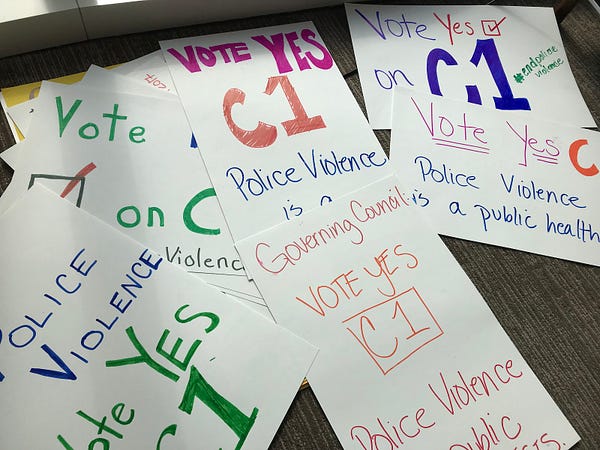
It was exciting to feel the buzz on this issue around the conference. On the morning of the vote, I joined dozens of APHA members rallying in front of the conference center, holding signs and chanting “APHA, practice what you teach today” and “no public health silence, in the face of police violence!”
Inside the Governing Council meeting, there was lively discussion among the voting members, expressing both support and opposition. Many of the people who voiced their opposition used racially coded language and claimed more time was needed to get the statement right, despite the year of work that went into strengthening last year’s statement. By the afternoon, the over 250 members of the Governing Council finally took a vote. To the disappointment of so many of us, the APHA Governing Council voted 65% to 35% NOT to adopt the policy statement.
APHA’s mission is to “improve the health of the public and achieve equity in health status.” With the Governing Council’s vote not to adopt this statement, APHA has failed in their mission.
The question many people were left with after the vote was — whose health matters? When it comes to Black, Brown, and other marginalized communities, is APHA turning a blind eye to health inequities and to community harm at the hands of the police?
Despite the outcome of the vote, I still see this as a victory. The outpouring of support for this statement builds on an important conversation within APHA on racism and what it could look like to be an anti-racist institution.
For those of us who supported this effort, we will continue our work for health equity and fight to end police violence. Some will continue to push APHA to recognize this public health crisis and and some will work within their workplaces and institutions on these issues. Others will go back to their communities and continue the struggle that’s been ongoing for generations to end a culture of police violence and create healthy communities. Whatever we do, it’s up to us to be vocal, insist that police violence is a public health issue, and be leaders and allies in the fight to dismantle institutional racism.


